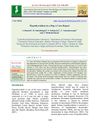 5 citations,
November 2021 in “Skin appendage disorders”
5 citations,
November 2021 in “Skin appendage disorders” Hair loss can cause stress and mental health issues, so treatments should address both the physical and psychological aspects, involving a team of dermatologists, psychologists, and hair specialists.
 5 citations,
January 2013 in “Otorhinolaryngology clinics : an international journal”
5 citations,
January 2013 in “Otorhinolaryngology clinics : an international journal” Platelet-rich plasma may improve healing and hair growth in cosmetic surgery but results vary.
5 citations,
March 2011 in “Journal of proteomics” Histone H4, released by cells exposed to colchicine, can cause hair loss by inhibiting cell growth and enzyme activity.
 4 citations,
November 2018 in “Endocrinology, Diabetes & Metabolism Case Reports”
4 citations,
November 2018 in “Endocrinology, Diabetes & Metabolism Case Reports” GnRH analogue can help diagnose ovarian causes of high testosterone in postmenopausal women when scans don't show the cause.
 3 citations,
January 2017 in “Yonsei Medical Journal”
3 citations,
January 2017 in “Yonsei Medical Journal” Blocking 11β-HSD1 can lessen the harmful effects of glucocorticoids on hair growth cells.
 2 citations,
June 2022 in “International Journal of Biomedicine”
2 citations,
June 2022 in “International Journal of Biomedicine” The review suggests a comprehensive approach to treat hirsutism, focusing on hair removal, medication, and managing emotional effects.
2 citations,
October 2021 in “Experimental Cell Research” Injectable platelet-rich fibrin helps hair growth by boosting key cell functions.
 2 citations,
December 2018 in “KSBB Journal”
2 citations,
December 2018 in “KSBB Journal” Amla extract helps hair grow and could prevent hair loss.
 2 citations,
December 2018 in “International journal of current microbiology and applied sciences”
2 citations,
December 2018 in “International journal of current microbiology and applied sciences” The dog recovered from hypothyroidism and regrew its hair after two months of treatment.
 1 citations,
January 2013 in “MedChemComm”
1 citations,
January 2013 in “MedChemComm” PF-05314882 selectively activates androgen receptors without much effect on prostate and may help in prostate cancer treatment and hair loss prevention.
 May 2024 in “Journal of Advanced Research”
May 2024 in “Journal of Advanced Research” Communication between blood vessel and hair follicle cells decreases with age, affecting hair growth and blood vessel formation.
 January 2024 in “Inflammation and regeneration”
January 2024 in “Inflammation and regeneration” Th22 cells are essential for Tβ15-induced hair growth in mice.
 July 2023 in “Biomolecules”
July 2023 in “Biomolecules” The new "whisker follicle microinjection assay" can test how different biomolecules affect hair growth and color.
 January 2013 in “Otorhinolaryngology clinics : an international journal”
January 2013 in “Otorhinolaryngology clinics : an international journal” PRP shows promise for improving healing and hair growth in cosmetic surgery but results can vary.

The document concludes that hair loss in women can be treated with topical treatments or hormone therapy depending on the cause.
March 2023 in “International Journal of bioprinting” Zinc/silicon-infused hydrogel helps regenerate hair follicles.
 1039 citations,
February 2009 in “Nature Reviews Molecular Cell Biology”
1039 citations,
February 2009 in “Nature Reviews Molecular Cell Biology” Skin stem cells are crucial for maintaining and repairing the skin and hair, using a complex mix of signals to do so.
 434 citations,
October 2003 in “PTR. Phytotherapy research/Phytotherapy research”
434 citations,
October 2003 in “PTR. Phytotherapy research/Phytotherapy research” Natural products in cosmetics are beneficial for skin and hair care with low toxicity.
 343 citations,
December 2008 in “Endocrine Reviews”
343 citations,
December 2008 in “Endocrine Reviews” Metformin helps with menstrual cycles and insulin levels in PCOS but is less effective for hair growth, diabetes prevention, and weight loss, and may improve fertility and reduce diabetes risk.
 305 citations,
February 2007 in “Hormone and metabolic research”
305 citations,
February 2007 in “Hormone and metabolic research” Human skin makes sexual hormones that affect hair growth, skin health, and healing; too much can cause acne and hair loss, while treatments can manage these conditions.
 195 citations,
May 2003 in “Obstetrics and gynecology (New York. 1953. Online)/Obstetrics and gynecology”
195 citations,
May 2003 in “Obstetrics and gynecology (New York. 1953. Online)/Obstetrics and gynecology” Most women with excess hair growth have an underlying hormonal issue, often treated with medication and hair removal methods.
 180 citations,
January 2003 in “American Journal of Clinical Dermatology”
180 citations,
January 2003 in “American Journal of Clinical Dermatology” Menopause can lead to skin and hair problems due to hormonal changes, but hormone replacement therapy might help slow these effects.
 175 citations,
November 2009 in “PLOS ONE”
175 citations,
November 2009 in “PLOS ONE” Women look young for their age due to larger lips, less sun damage, and genes that prevent gray hair and wrinkles.
 174 citations,
November 2002 in “Expert Reviews in Molecular Medicine”
174 citations,
November 2002 in “Expert Reviews in Molecular Medicine” Hair loss needs more research for better treatments.
173 citations,
August 2015 in “Developmental cell” The study identified unique genes in hair follicle cells and their environment, suggesting these genes help organize cells for hair growth.
 165 citations,
January 2008 in “Journal of biomaterials science. Polymer ed.”
165 citations,
January 2008 in “Journal of biomaterials science. Polymer ed.” The peptide GHK-Cu helps heal and remodel tissue, improves skin and hair health, and has potential for treating age-related inflammatory diseases.
149 citations,
June 2010 in “The FASEB journal” miR-31 regulates hair growth by controlling gene expression in hair follicles.
 148 citations,
December 2018 in “Journal of autoimmunity”
148 citations,
December 2018 in “Journal of autoimmunity” Alopecia areata is an autoimmune disease causing patchy hair loss, often with other autoimmune disorders, but its exact causes are unknown.
 138 citations,
May 2000 in “Maturitas”
138 citations,
May 2000 in “Maturitas” Estrogen replacement can improve skin health in menopausal women but doesn't reverse sun damage or prevent hair loss.
134 citations,
July 2020 in “Experimental dermatology” Hair follicles are normally protected from the immune system, but when this protection fails, it can cause hair loss in alopecia areata.























